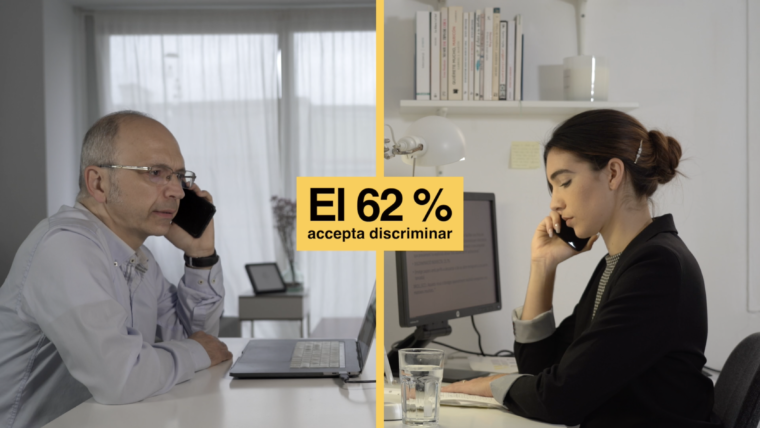Over 60% of property agents accept ethnic discrimination when renting out homes
A new report on exclusion in the housing rental market on the grounds of people’s origins, based on calls to property agents operating in Barcelona, concludes that 62% of agents approached accept discrimination.A first study on discrimination in access to housing was presented in 2020, and two fines imposed: one for offering a home for “Spanish people only”, and another for a case of direct discrimination. These were the first fines of this type in the Spanish state. Under the title Discriminació a la carta, the new study finds evidence of this type of discriminatory practice in the sector.
The 350 calls to property agents operating in the city were made posing as a fictitious owner seeking to rent out a flat and asking for immigrants to be excluded from the tenant selection process. The answers obtained from the property agents contacted show that a significant majority openly accept such discrimination:
- Accepting of discrimination: in 62% of cases the agent accepted the discriminatory request and excluded the specified profile in the selection process.
- Facilitation of discrimination: in 24% of cases the acceptance of discrimination was not direct, but various practices were detected that result in the specified collective being excluded from access to the home in the same way.
- No ethnic discrimination: in 10% of cases the agent refused to accept the proposed discrimination.
- Evasive response: in 4% of cases the agent avoided responding to the request.
The studies help identify and quantify the scope of this type of discrimination, determine to what extent it is normalised in the sector and decide how to work together with agents and organisations to eradicate it. The results have been conveyed to the Property Administrators’ Association (API) and the Chamber of Urban Property, and the resources, training and mediation services offered by the Office for Non-Discrimination (OND) have also been made available.
Presence of prejudice and stereotypes
In the discriminatory request from the fictitious owner the caller consciously only opts for the term ‘immigrant’, without any further explanations on ethnic origin, religion or social class, meaning the discrimination was interpreted as referring to people from certain countries. Throughout the experiment, the study observed that the responses from property agents demonstrated a clear distinction between the ‘immigrant’ population, corresponding to the profile being discriminated against, and the ‘foreign’ population, which is not targeted.
Another important aspect which emerged during the study is that this is a shrouded practice. Some 94% of property agents spontaneously note that such discrimination cannot be publicised, without the fictitious owner requiring a filter being applied to the property ad.
The fact that the discrimination is not publicised or never openly displayed by the property agents demonstrates an initial obstacle when it comes to proving that it occurs. Secondly, the use of deceit and lies towards the people discriminated against, strategies which the agents admit to and which are noted in the study, make it even more difficult to prove. In turn, this makes it more difficult to pursue, penalise and repair.
More discrimination between non-affiliated agencies
The study Discriminació a la carta has helped identify substantial differences between the behaviour of officially affiliated agents and those which are not. Despite the fact that discrimination is accepted by a majority in both cases, the figure among non-affiliated agencies was 3 out of every 4, compared to a slightly lower figure among affiliated agents. At the same time, the figure for affiliated agents rejecting any sort of discrimination was higher, at 15%, compared to the those that don’t, at just 5%.






Further information
Related news
-
 Inclusion
Inclusion
Inclusion
InclusionRacism, xenophobia and LGBTI-phobia, the main reasons for discrimination in the city
06/09/2021 10:45 h
-
 Housing
Housing








